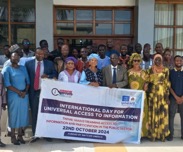
The event organised in collaboration with NATCOM-UNESCO, centered on the theme ‘Mainstreaming Access to Information and Public Participation across Government Sectors’. Further, the event marks a significant milestone in promoting transparency and accountability as it also created a platform to facilitate discussions on the role of access to information (ATI) in advancing democracy and good governance, as well as the challenges and opportunities in implementing the ATI Act in The Gambia.
Addressing the gathering, Neneh Macdouall Gaye, chairperson of the Access to Information (ATI) Commission, outlined the critical importance of universal access to information, which she said is a "key driver for development."
She highlighted how access to public information empowers citizens to address pressing global challenges such as climate change, corruption, public health, and social abuse.
"The ATI law is a demonstration of political will, but its effective implementation will require coordinated efforts from all sectors of society," she remarked, underlining the need for collaboration among public institutions, civil society, media, and the academia.
She described the theme for this year’s event as apt as it aligns with the broader objective of fostering openness in governance, thus urging participants to reflect on the power of information in strengthening democratic participation and enabling citizens to navigate complex societal challenges.
Representing UNESCO, NATCOM Director General, Ms. Maimuna Sidibeh, Secretary General of UNESCO Gambia Office, reiterated UNESCO’s commitment to promoting access to information as a fundamental human right and a key contributor to achieving the Sustainable Development Goals.
Ms. Sidibeh emphasised ATI is crucial for democracy, development, and equality, and so the international community must prioritise its integration into legal frameworks.
Fanding Kinteh, Deputy Permanent Secretary at the Ministry of Information, Media, and Broadcasting Services, reminded of the enactment of the ATI law in 2021 and shared details of the Ministry's efforts to develop an ATI implementation roadmap and strategy, marking the beginning of a transformative era in governance.
"We are committed to ensuring that access to public information is upheld and that our citizens are fully engaged in democratic processes."





